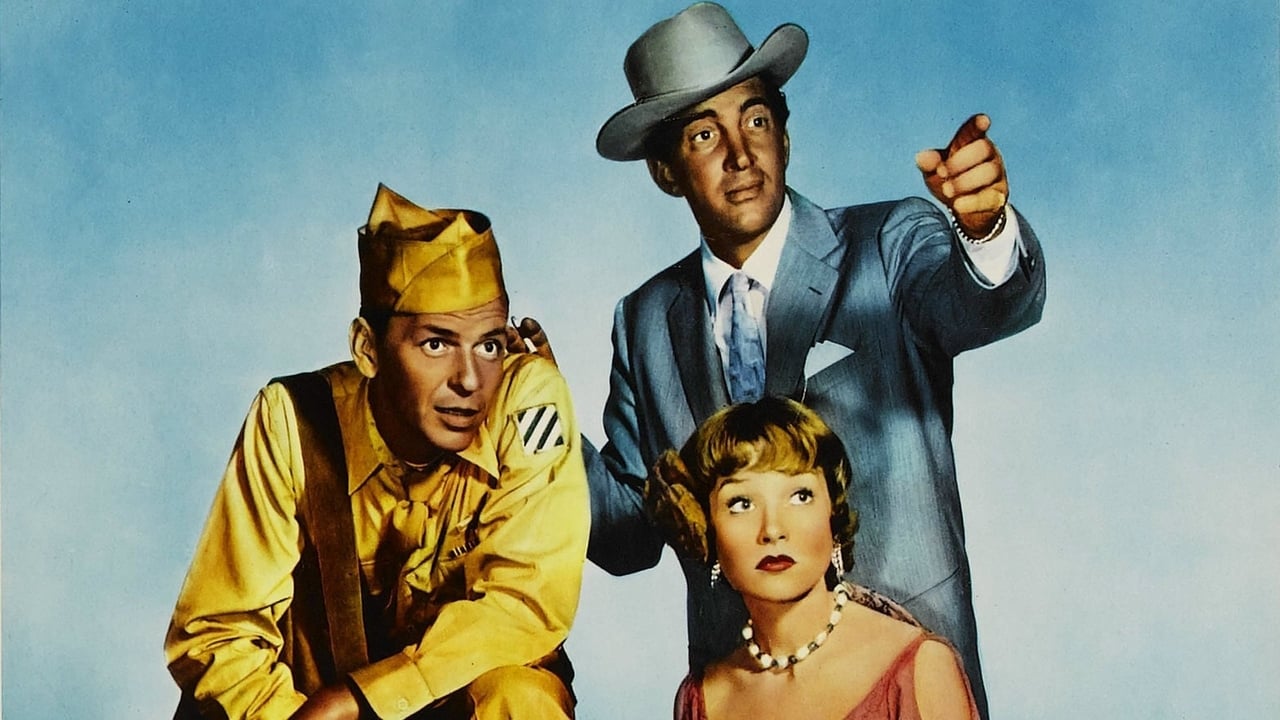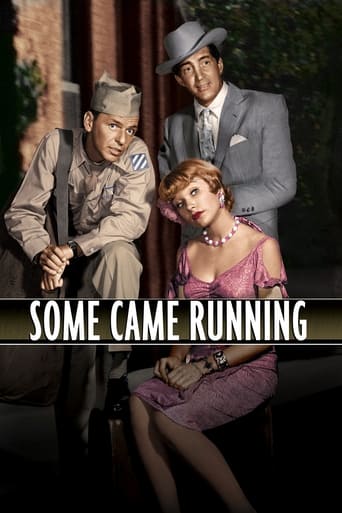

This is one of the few movies I've ever seen where the whole audience broke into spontaneous, loud applause a third of the way in.
... View MoreThis is a gorgeous movie made by a gorgeous spirit.
... View MoreI enjoyed watching this film and would recommend other to give it a try , (as I am) but this movie, although enjoyable to watch due to the better than average acting fails to add anything new to its storyline that is all too familiar to these types of movies.
... View MoreStrong acting helps the film overcome an uncertain premise and create characters that hold our attention absolutely.
... View MoreThis film is based upon a novel by James Jones of the same title. He was the author of FROM HERE TO ETERNITY, filmed five years before this by Fred Zinnemann. Vincente Minelli's attempt here to make a James Jones blockbuster did not have quite the impact of the former film, but Shirley MacLaine's performance is such a masterpiece of pathos that from one end of America to another at the time of this film's release, no one could easily wipe away the tears after seeing her portray Ginnie Moorehead, with her small, struggling brain, but her heart the size of the world. This was the film that revealed Shirley MacLaine as one of the most brilliant young actresses in American cinema, a view amply confirmed a few years later when she appeared in THE APARTMENT (1960). MacLaine's spontaneity, vividness, warmth, and intuitive understanding of her character make this film a classic, whatever else it may have or lack. Martha Hyer also gives a splendid performance of great complexity as a woman who prefers the dreamworld of literature to real life, and when faced with a marriage proposal from an author whose works she adores, obstinately refuses to leave the dream for the reality. Frank Sinatra is the unexpected choice to play Dave Hirsh, a novelist of great talent not only with the pen but with the bottle, lacerated by self-loathing and equally keen to remain in his dream of being a bum and a self-destructive drunk. When Fred Zinnemann rescued Sinatra from the scrap heap and cast him in FROM HERE TO ETERNITY, it electrified everyone, because the washed-up crooner from Hoboken suddenly showed everybody he could act. Nobody had ever expected that of him, as he was thought to be merely a singer who excited the 'bobby-soxers', as teenage girls were then known, of the 1940s and who had passed his sing-by date. And so his second career as a superstar unexpectedly began, hence his casting in this second James Jones film. He does a very good job of acting here too, but at the cost of some subtlety to the story. I have not read the novel, but I doubt that Jones's anti-hero was meant to be quite as coarse as Sinatra naturally was. At the beginning of the film, Sinatra returns to his small town home in Indiana beside the Ohio River (which is seen in great panoramic location shots from hilltops) after four years in the Army, checks into a hotel, and is seen unpacking novels by John Steinbeck, William Faulkner, and Thomas Wolfe. No matter how hard one stretches one's imagination one cannot visualize Frank Sinatra reading any of those! In other words, more subtle casting of the main character would have made for a much better film. The character as portrayed by Sinatra arouses not the slightest hint of sympathy in the viewer, and he is merely a rather disgusting and self-pitying lush and womanizer with the coarse manners of a street urchin. Hence this could never be great cinema, despite all the efforts of MacLaine and Hyer to raise it to the higher level of a genuine tragedy. There is no doubt that Sinatra is watchable, but then Bob Hope playing Hamlet would also be watchable, wouldn't he? If Sinatra had betrayed the slightest hint of human compassion in his role (and it would seem, would it not, that that must be a prerequisite for someone who is supposed to be such a marvellous novelist himself?), then this film could have coalesced into the vision its author must have intended. Oh well, flawed projects litter the highway of the cinema, like wrecked cars. Some of themes of this story became over-familiar through the years. I am referring to the talented writer who 'can't come home again' as Thomas Wolfe put it. They returned to their small towns in the American hinterland and found that they were alienated from those surroundings because their horizons had become too expanded, and they came up against an insuperable barrier, what is often called 'the small town mentality'. Of course, these days there is no such resonance, since American small towns have largely ceased to exist in the sense that they once did. They are no longer self-contained, their Main Streets are deserted and all their former shops, once filled with throngs of locals buying the necessities of life, are now charity shops, all the shopping has moved to the malls, all the townspeople have become obese mountains of wobbling human flesh who cannot get out of their cars to walk down a street because of junk food, and outsiders dash in and out on the interstate highway system, heedless of local traditions and caring nothing for where they are, other than as a temporary convenience before they move to the next town. The small towns are gone, except as skeletons like those of the dinosaurs in the natural history museums, and stories like this are thus historical tales dating from a vanished age when they really mattered. All of the angst suffered by the James Joneses and Thomas Wolfes trying unsuccessfully to return home to their small town origins are as far from contemporary reality as the voyages of Odysseus (Ulysses) as he struggled to return home to Ithaca. It is thus that a lot of the 'zing' has gone out of this film because younger people cannot 'get it'. They no longer know, and if they did, they would no longer care, what the attempt to 'come home again' to the small town once meant for sensitive souls who had outgrown the chrysalis. Now there is no Home anymore, there is only Facebook. And there is never any trouble returning to Facebook, for your 1000 best friends are there waiting to ignore you and will not bite back. In fact, people like Frank Sinatra are welcome, since on the internet you cannot smell whisky on people's breath.
... View MoreThis is a rather engrossing movie despite some stilted dialogue and humdrum performances. Frank Sinatra plays Dave Hirsh, a writer down on his luck, who returns to his hometown after a stint in the army. Like all writers depicted in the 1950's, he drinks a lot and is fatalistic to the degree that he marries a known tramp (brilliantly played by Shirley MacLaine) when the woman he really loves (Martha Hyer) spurns him because he isn't solid husband material.The best I can say about Sinatra's performance is that he's adequate. It would have been far more exciting to see how Marlon Brando would have pulled off this role. Dean Martin as Hirsh's buddy, Bama, a small time gambler, is entertaining as usual, but it's Shirley who brings the film to life and makes it worth watching.She plays Ginnie Moorehead, a truly luckless girl, who is nonetheless, the kindest, most sympathetic character in the whole movie. It's clear she's known nothing, but tough breaks since the day she was born, but her determination to show everyone "a good time" makes her valiant.
... View MoreThis movie is a sure cure for Insomnia, except for the most extreme cases.Sinatra and Dino play two guys that don't make a bit of sense, but we're supposed to think they do.In other words, they play the characters they always play in movies together.What they are talking about is not just outdated. It never existed. I was born in 1956, and nothing they do or say makes any sense to me.The movie makes no sense either. It is just a bunch of words strung together, apparently written by people on drugs.It's some sort of melodrama, but don't try to stay awake through it. It'll just make you hate the idiots in the movie even more.Some came running to watch the movie. All left sleeping.
... View MoreThis is a really good story, for adults who've seen something of life and know the score. Life and relationships aren't simple, things are often sad, unfair, bitter; but we all cling to the hope offered by understanding and love from other people. Dave Hirsch (Frank Sinatra) is a good character, a writer who returns in his Army uniform to the small town where he was never especially happy. He's been hurt, but he's still willing to be vulnerable and open. He's a fair, decent guy, a good friend, a person others lean on and like for his strength.One of the more interesting things in the film is how he interacts with Gwen French (Martha Hyer), the schoolteacher who appreciates and is excited by his talent but who can't relate to his world. It's sad to see these two trying to relate to one another. Him with his straightforward approach to life, and his openness, and her with her many layers of defenses, and shut-down emotions. The overall feeling I got was frustration that she couldn't appreciate the good things in the man.Martha Hyer plays Miss French very well, though you must accept her somewhat mannered approach that is a little like Grace Kelly's. I was a bit baffled by Gwen's motivations at times and I wondered if censorship had anything to do with it. The three leads are marvelous. Shirley MacLaine is like you've never seen her before. Playing a dumb but happy chick who is pure as the driven slush, she is funny, annoying, touching, and at times, the most sensible person in the room.Dean Martin gives one of his first non-musical, dramatic, post-Jerry Lewis portrayals as card sharp Bama Dillard, who Dave takes up with in his home town of Parkman, Indiana (and on a big side trip to Terre Haute). Dean is perfect in the role, and his interactions with Sinatra are full of sparks.As Dave's brother, a small town hypocrite who owns and operates the local jewelry store, Arthur Kennedy gives an excellent performance. His lavish home, and the home of Gwen and her professor father, are in stark visual contrast to the very humble surroundings of Dave and his friends - bars, rented houses, bus stations, etc.In smaller parts, Viola Dana and Connie Gilchrist are among the standouts.Minnelli described his desire to make the holiday-carnival atmosphere in the final scenes seem like "the inside of a jukebox." And that's exactly what it's like.Some Came Running is a satisfying, beautifully directed and designed, well acted drama of Midwestern postwar 1940's angst, filmed in gorgeous 1950's CinemaScope. The score by Elmer Bernstein is wonderfully evocative.
... View More